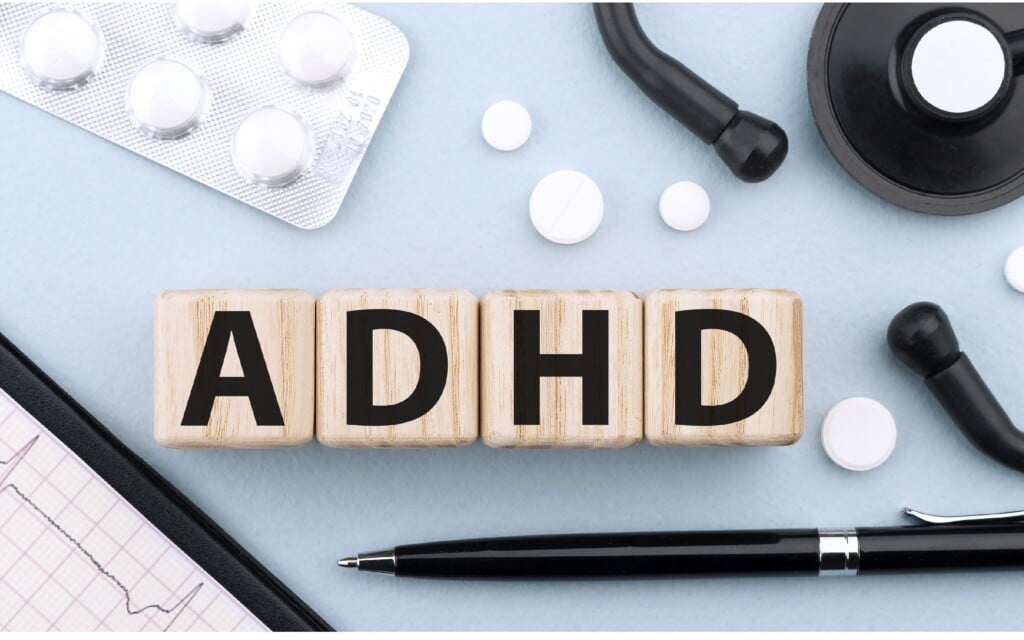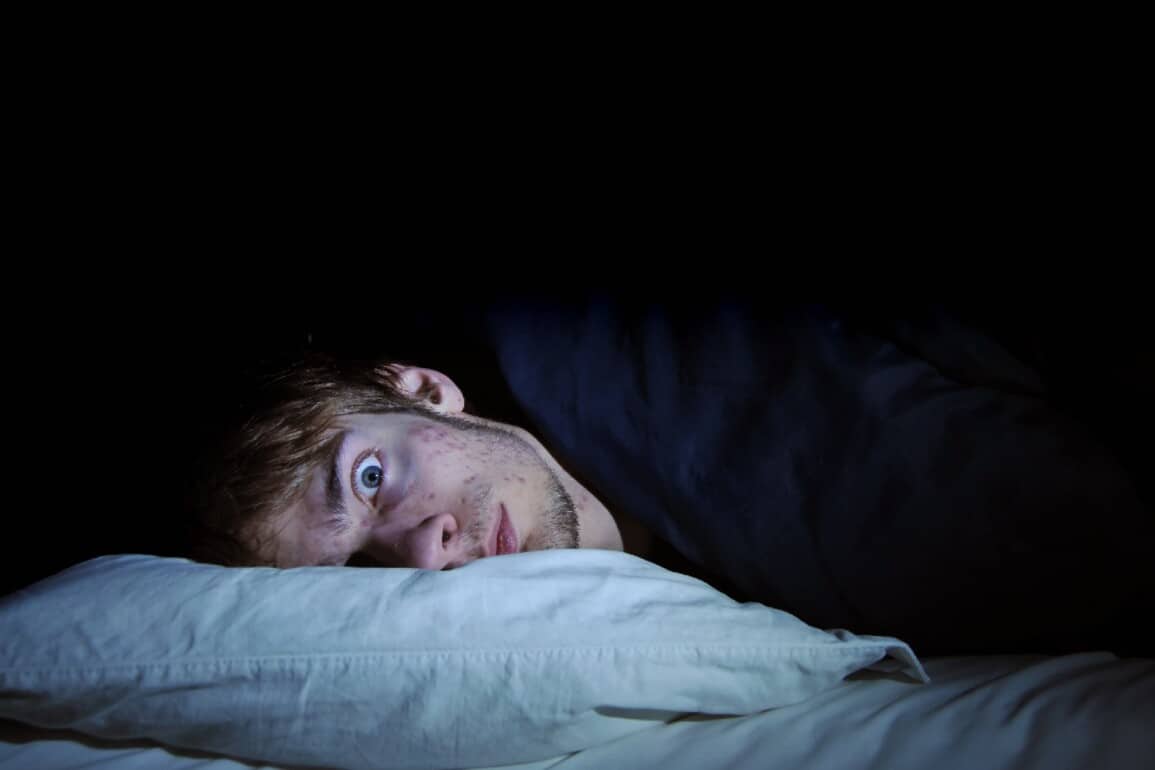Figuring out how to sleep on Adderall isn’t always easy. This unique medication is specifically designed to stimulate the central nervous system and improve focus. So, how do you get a good night’s sleep on a regular schedule of Adderall?
Like many medications, Adderall affects the user in a multitude of different ways – some intended, others unintended. Taking Adderall regularly is supposed to ensure you can improve your focus, but this doesn’t mean you want to maintain that focus at all times.
Today, we’re going to look at the complications involved with taking Adderall, when it comes to managing insomnia and trouble sleeping. Read on to discover whether you can counteract the effects of Adderall with melatonin supplements, and which sleep advice really helps your slumber!
How does Adderall work?
Designed to treat people with ADHD, ADD or narcolepsy, Adderall is a prescription drug using a combination of dextroamphetamine and amphetamine. Influencing the central nervous system, Adderall changes the balance of various natural chemicals in the brain and assists with concentration.
Adderall’s interaction with the central nervous system means it increases the release of dopamine, but also prevents the reuptake of the chemical, which can improve alertness and focus. Although Adderall is a common treatment option for the management of the mentioned disorders, it’s no secret it is widely used as an performance enhancer in otherwise healthy people.
Adderall’s impact on the body often involves a change in sleeping patterns. Up to 33% of people taking Adderall also have sleep disturbances, including frequent awakenings, fatigue, and insomnia.
Some people can suffer from a decrease in REM sleep when taking Adderall. Bearing in mind people with ADHD might experience an improvement in sleep quality on prescription stimulants.
How to make Adderall wear off so I can sleep?
A quick search on Google shows how common problems with Adderall and sleep can be. The question “How to make Adderall wear off so I can sleep” appears frequently on the web. Unfortunately, you can’t force a medication to wear off as quickly as you might like.
Adderall causes various side effects, from nervousness and dizziness, to a dry mouth. Insomnia can be the most problematic side-effect of Adderall. It significantly worsens emotional issues, like stress, anxiety, and irritability.
To begin with your medical professional will aim to reduce the risk of sleep side effects from Adderall by reducing the dose of the medication. Lower doses of Adderall are less likely to cause side effects.
To get optimal sleep, your doctor may also recommend taking the medicine in the morning, rather than on a night. This way much of the substance can move through your system by the time you’re ready to sleep. You can also consider the following:
Avoid drug interactions
Adderall can interact with other medicines and increase your risk of insomnia. It’s best to avoid exposure to drugs like Lexapro, Fluoxetine, and Sertraline where possible. Here’s of list of medications that cause insomnia.
Reduce exposure to other stimulants
Stimulants like drugs and alcohol can worsen your response to Adderall. Though you might initially feel like drinking helps to settle your mind for sleep, it actually has a significant impact on your ability to sleep well.
Limit caffeine
Caffeine intake can significantly stimulate the mind and body, making it even harder to get to sleep when you want to. Staying away from potential sources of dietary stimulants, is a good way to protect your sleep habits.

Melatonin and Adderall: Can you take both?
Melatonin and Adderall are beginning to have a stronger connection in the medical world, as doctors search for safe solutions to the sleep issues caused by Adderall.
Approximately 50-60% of adults with ADD also have sleep problems. If Adderall worsens these issues, the side effects can be significant. Melatonin could be the answer.
Melatonin is a safe and effective solution for managing sleep issues. Available over the counter in a lot of regions, this substance is a synthetic form of the hormone we already produce to ensure we can fall asleep. In trials, melatonin has proven itself to be a reliable treatment option for children with ADD who also suffer from poor sleep.
However, like most medications for sleep, long-term use of melatonin(for years) isn’t thoroughly researched. There are situations where melatonin treatment may not be appropriate. In these cases, doctors will recommend coming up with a long-term sleep hygiene strategy to help ensure good sleep over time.
Can you take melatonin with ADHD meds?
Answering the question “Can I take melatonin with ADHD meds” is a little complicated. For most people this answer is yes. Taking melatonin and Adderall might be suitable for most, but it won’t be the right treatment for everyone. Adderall and melatonin have a unique relationship with sleep.
In most cases, people with ADD can have problems with delayed onset of natural melatonin production. Lack of melatonin means we stay awake and focused for longer, so taking melatonin can help to get your circadian rhythm back on track.
In some cases, melatonin can cause a number of side effects, such as dizziness and agitation. Suffering from ADHD or ADD, you might already feel agitated and don’t need the added discomfort. Additionally, some people who take melatonin regularly, may find the substance stops having a significant impact on their sleep habits over time.
If your doctor does recommend taking melatonin for sleep with ADD, you generally won’t be advised to take the medications at the same time. Melatonin is best taken at night, not long before you’re planning on going to sleep. Adderall, alternatively, should be taken on a morning.
Can you take sleep aids with Adderall?
If you’re struggling significantly with your sleep when taking Adderall, your doctor will conduct an evaluation to determine what kind of strategy you can use to improve your quality of rest.
You may be asked to take a sleep journal to identify the nature of your sleep issues. For instance, you might struggle to get to sleep initially, or wake up frequently during the night.
Knowing exactly how Adderall influences your sleep can help to guide your treatment plan. In many cases, treatment won’t start with medication, as the number of interactions between Adderall and other substances is reasonably high.
If sleep aids are necessary, but melatonin isn’t appropriate, your might benefit from using L-theanine instead. This molecule is relatively safe in most doses, and can be very well tolerated in people with ADD.
Whatever your side-effects from taking Adderall, remember you should never start experimenting with sleep solutions involving medication on your own. Interactions can be extremely dangerous, and lead to very problematic side effects.
Speaking to your doctor will ensure you get the safest treatment, and could also help to address some of the other side effects of Adderall which may influence sleep, such as:
- Headaches or migraines
- Anxiety and panic attacks
- Constipation and abdominal pain

Tips for falling asleep on Adderall
As mentioned above, melatonin is a fairly safe option, but most medical professionals will advise strategies to improve your sleep habits, rather than going straight to medication as an option. Your doctor might lower your dose of Adderall slightly, or ask you to follow a different regiment when taking your medication.
You’ll also be advised on sleep hygiene practices, such as:
Routine
Creating a routine with a specific rising and bedtime can help to keep your body in its natural rhythm. A good routine also helps to relax you before bed.
Relaxation
Techniques for relaxation, like taking a warm shower or bath before bed, practicing yoga or meditation, or diffusing essential oils can all help you sleep.
Atmosphere
Your bedroom should be dark, cool, and quiet to ensure a good sleeping environment. Avoid screens before bed, and make sure you’re comfortable.
Diet
Avoid exposure to caffeine and other stimulating substances, particularly within the hours before you’re going to bed. You may also need to reduce eating habits late at night.
Exercise
Regular exercise can improve your health in a multitude of ways, including improving your ability to fall asleep. Exercising regularly could help to bypass some of the effects of Adderall.
You can also experiment with other methods approved by your doctor, like drinking herbal teas to calm your mind and body. Just ensure nothing you take will have any impact with the medications you’re using.
Why do I sleep better when taking Adderall?
Most people who take Adderall will find they have increased issues with their sleep caused by higher levels of focus. However, there are some people who might have an opposite response. Amphetamine in Adderall can make most people energetic, but it also has a calming and sleep inducing effect on some people with ADHD.
Clinical trials show around 6% of people taking Adderall feel fatigued. You may also encounter significant sleepiness if you stop taking Adderall. Particularly if you’ve been taking a decent amount of this substance for some time.
If Adderall is making you feel exhausted on a regular basis, your best option is to speak to your doctor. Professionals can help to find the route cause of this side effect, and help you take steps to avoid it. If you’re sleepy because you’re having a “crash” after not taking Adderall for a while, then your doctor might advise medication to manage your symptoms.
Siestio. Sleep Matters.
Here’s some other useful advice to improve your sleep:
—How to get your rest without having to consume alcohol
—Should you consider using melatonin for sleep disorders?
—The negative consequences of mixing melatonin and alcohol
Medical disclaimer
You must not rely on the information provided on our website as an alternative to medical advice from your doctor or other healthcare professionals. For more information read our full disclaimer here.







